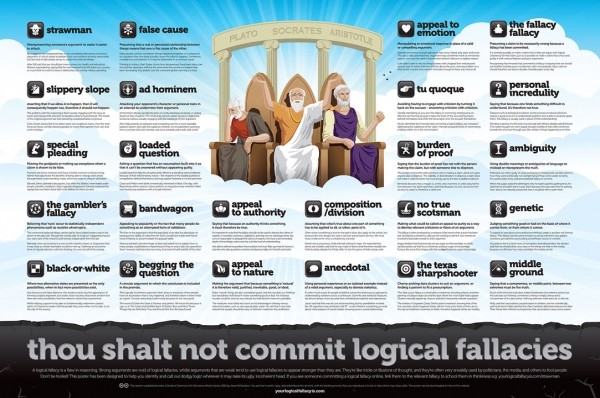Recently, my friend and regular City Weekly cinema contributor Eric D. Snider pointed me via Twitter link to a delightful novelty item: The Logical Fallacies Poster. Beneath an illustration of Plato, Socrates and Aristotle were two-dozen common rhetorical devices used to bypass simple reason when attempting to argue a point. You might know them better as “The Things That Comprise Nearly Every Public Utterance By an Elected Official.”
Every one of them was depressingly familiar in one form or another—the straw man, the appeal to emotion, the ad hominem attack—yet I found myself drawn to one labeled “personal incredulity.” It describes a line of argument by which someone dismisses something because, for whatever reason, they simply don’t understand how such a thing could be possible.
“It doesn’t make any sense to me that anything humans do could change the whole environment,” goes a personal incredulity reasoner, or, “I just don’t understand how two guys could want to have sex with each other.” Or, to avoid playing philosophical favorites, “It’s ridiculous to me that anyone could believe in a supernatural God.” The limits of one’s ability to imagine a world beyond one’s own knowledge, experience or comprehension become the limits of one’s ability to wrestle with a complex issue. I don’t get it; that settles it.
That same notion had been swirling around in my head after reading a collection of nonfiction essays called Manhood for Amateurs by the Pulitzer Prize-winning novelist Michael Chabon. In a chapter on the value of art—and, specifically, the kind of art like comic books and popular movies that inspires fervent fandom—Chabon expresses a sentiment that I’ll almost certainly butcher by virtue of not being able to recall it precisely. But at its core was this notion: More evil in the world can be attributed to lack of imagination than to anything else.
While the context for Chabon’s quote was a certain kind of art, he wasn’t arguing that evil comes from those who don’t appreciate costumed superheroes or the mythopoetic grandeur of Star Wars. Rather, he was referring to the evil that comes from the inability—or the unwillingness—to put oneself inside the head of another who thinks, feels or lives differently. It’s the nucleus of the epidemic of Other-ness that turns national debates into arguments over who must hate America, or hate black people, or despise those lower-class moochers, or want to strangle Baby Jesus in the manger just so we don’t have to sing “Silent Night” in the school “holiday pageant.”
It can also be a strategy used cynically but oh-so-effectively by media outlets and politicians; demons are more compelling to people than gray-shaded conversations. We can sneer at those who do things or believe things we’d never possibly do or believe because it’s uncomfortable to think about personal compasses that point in different directions than the north we know is true.
And there’s also a misguided false equivalency that suggests that even acknowledging the point of view of the Other as something besides evil must be tacit acceptance. Recognizing why someone might consider abortion a valid, non-mortal-sin option doesn’t require you to tear off your “It’s a child, not a choice” bumper sticker and form a human barricade protecting Planned Parenthood. It’s merely a way to separate one’s personal value system from simplistic divisions between Those Who Agree With Me and Therefore Are Good, and Those Stupid Stupid Idiots. Lack of imagination is a disease—a gaping psychic hole where a broader, fundamental compassion for the spectrum of human experience should be.
This is where art comes in—as Chabon phrases it, to assert “the possibility of fellowship in a world built entirely from the materials of solitude.” Books, plays, movies, songs and works of art of all kinds take us for a moment out of our own heads and the mundane details of our own existence and into the lives of others—into the mind of a young Jewish girl hiding away in an attic, or a black woman subjected to a life of abuse, or a man trying to figure out how he could possibly be in love with another man. Those who lock themselves into the worlds they know—often deliberately avoiding ideas that challenge what they already believe, even as a point of moral pride—don’t even give themselves a chance of imagining a new, different way of thinking.
It’s easy to think that such a description only applies to the Someone Else you’re picturing in your head—the guy who belongs to the other political party, maybe, or that certain religious group. And that, in itself, indicates a lack of imagination. We assume it’s someone else who needs to change their perspective, to come around to our clearly correct way of thinking.
There’s a crucial, fundamental humility at work in taking a moment, no matter the subject at hand, to pose the question, “What if I’m wrong?” Or, to a less extreme degree, “What if understanding why someone else thinks differently might shift my perspective ever so slightly, even if it’s just to feel less bitter and angry about Those People?”
Imagination demands that we keep asking “what if” about the world and the people around us. “Personal incredulity” simply allows a shrug and an arrogant dismissal to do the work of reason. It’s hard for me to imagine living that way.
More by Scott Renshaw
-
Film Reviews: New Releases for April 19
The Ministry of Ungentlemanly Warfare, Abigail, The Beast, Hard Miles, Sasquatch Sunset and more
- Apr 19, 2024
-
Faces of Salt Lake County book and portrait reception
Images and personal stories in a new book reveal local demographic diversity
- Apr 17, 2024
-
Feature film review: THE BEAST
A filmmaker's compelling ideas get a bit tangled in references to his creative influences.
- Apr 17, 2024
- More »
Latest in Opinion
Readers also liked…
-
Russian Army Conscripts Asking, 'Where's Our Underwear?'
Smart Bomb: The completely unnecessary news analysis.
- Dec 21, 2022





